
Labour’s Marsha de Cordova has called on the government to “urgently undertake and publish a meaningful equality impact assessment” of its coronavirus recovery strategy.
The Shadow Women and Equalities Secretary said that the government should make sure that those “most at-risk” are protected, including women, LGBT+, BAME and disabled people.
The party highlighted research from the Centre for Labour and Social Studies showing that only one in ten on low incomes are able to work from home and that BAME people are four times more likely to work in an industry shut down by the virus.
Commenting on the recovery strategy, de Cordova said: “We have already seen how Covid-19 has exposed and exacerbated economic, health and social inequalities in our society.
“It is vital that the groups most at-risk to in this crisis, including the BAME community, women and disabled people, are protected in the government’s plans to ease lockdown.”
The party said that following government announcements, many “face pressure to return to work and risk their safety”, and that this is likely to disproportionately impact women and BAME people.
The MP for Battersea added: “That is why Labour is calling on the government to urgently undertake and publish an equalities impact assessment of its coronavirus recovery strategy.”
Under the 2010 Equality Act, the government has a duty – like all public authorities – to “advance equality of opportunity between persons who share a… protected characteristic” and eliminate unlawful discrimination.
The document outlining the UK’s recovery from Covid-19 does not acknowledge additional risk faced by BAME communities – despite data from the ONS which found that black men are 4.2 times more likely to die from the virus.
With health factors and deprivation taken into account, the figures suggest that black people are 1.9 times more likely to die than their white counterparts. Those of Indian, Pakistani and Bangladeshi ethnicity are also at increased risk.




More from LabourList
Nudification apps facilitate digital sexual assault – and they should be banned
Diane Abbott suspended from Labour after defending racism comments
Labour campaign groups join forces to call for reinstatement of MPs